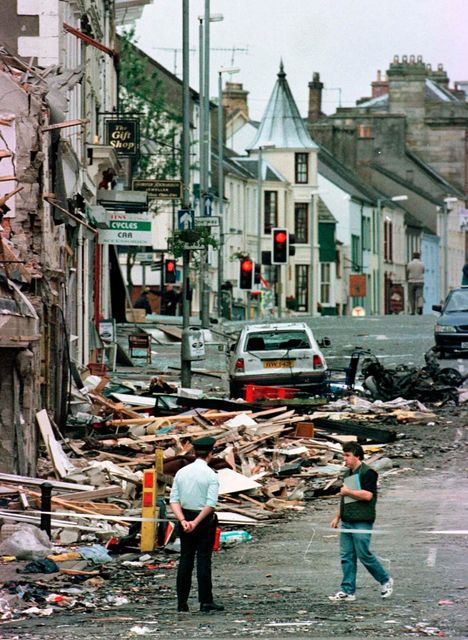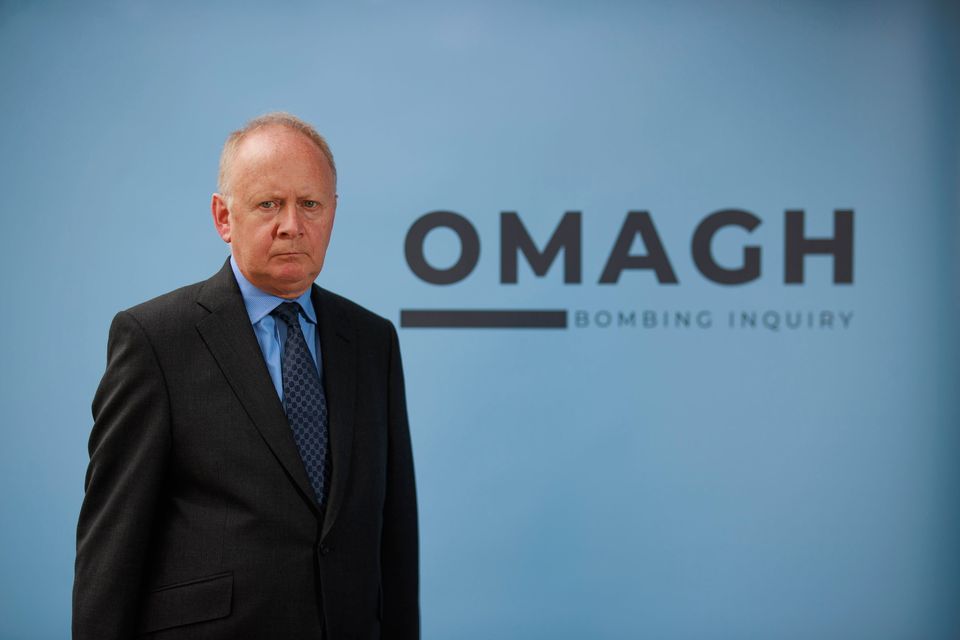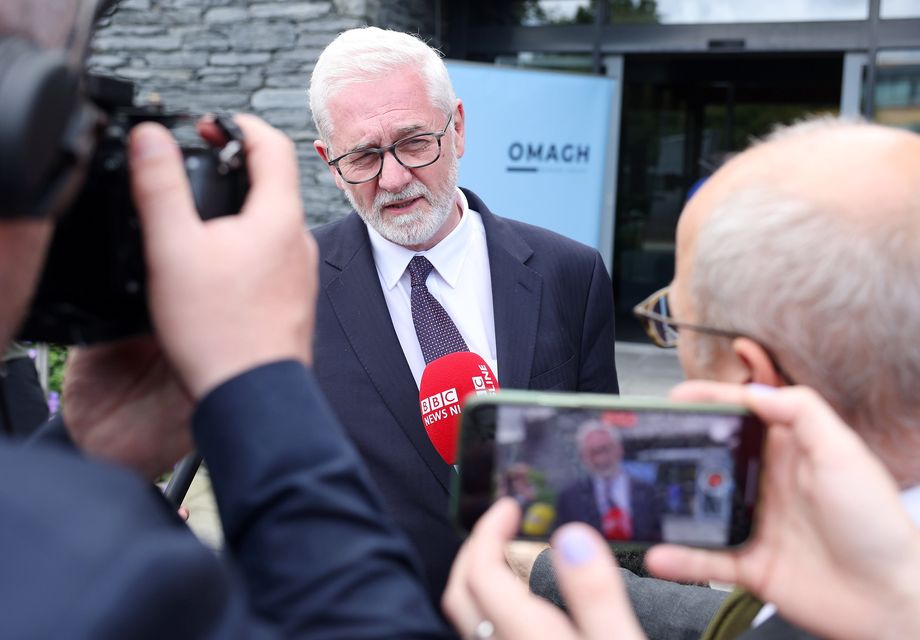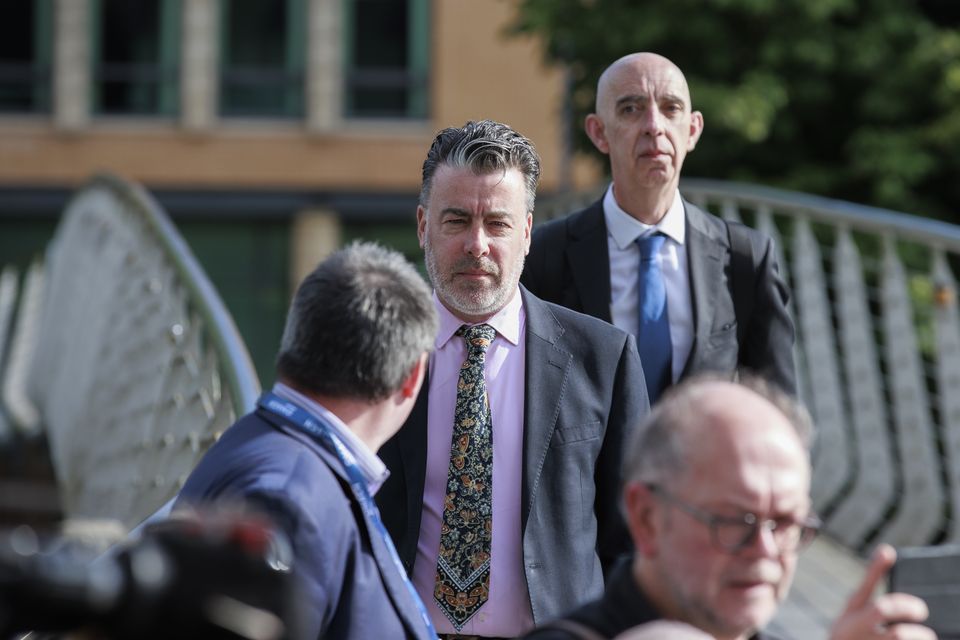The weather on the morning of Saturday, August 15, 1998, was sunny and quite warm with a few clouds in the sky.
Every little moment can bring back a memory.
Almost 26 years later, there was little difference, except for the passage of time.
That time has not been kind to the bereaved relatives of the Omagh bombing. They have lived every day with the trauma, the memories and the hope that one day, the truth will be heard.
Around 9.30am, Michael Gallagher, accompanied by Stanley McCombe, walked up the path towards Strule Arts Centre in the Co Tyrone town. Once again he faced the media.
File photo of the aftermath of the Omagh bomb (Credit: Paul McErlane/PA Wire)
His first remark was on how that sunny weather mirrors so well the day 31 lives were lost in the single biggest atrocity of the Troubles. That it came so soon after the signing of the Good Friday Agreement, made it all the more unexpected, sudden and difficult to bear for those who were affected.
At the reception in Strule Arts Centre, a box of hankies was at the ready. Quiet, emotional, thoughtful as the hush descended.
In his opening statement, Inquiry Chair Lord Turnbull said the pain of bereavement and trauma caused by the dissident republican bomb attack spread beyond Omagh and Northern Ireland to families from England and Spain.
Read more
He also said the attack caused “outrage and consternation across national boundaries and across continents”.
Those boxes duly ticked, and it was nothing that hadn’t been heard before. It still had to be said.
But over the course of the next year and a half, with proceedings not expected to conclude until the end of 2025, the independent inquiry into the bombing will examine whether there was a possibility the atrocity could — and should — have been prevented.
Lord Turnbull said the inquiry will undertake its task “rigorously and fearlessly”. Words which could easily be used to describe the way Michael Gallagher — who lost his son Aiden in the bombing, has approached the task of getting to this stage.
Chair of the Omagh Bombing Inquiry Lord Turnbull at the Strule Arts Centre in Omagh Liam McBurney/PA Wire
He said today’s hearing will be the first time since 1998 that all of the bereaved families, including those caught up in the blast from Spain, will come together.
“It has taken us all of those 26 years to get here and we’re just delighted,” he said.
“One of the sad ironies is that when I got up this morning and saw the sunshine, it was exactly the same on August 15 1998. It was one of the most beautiful days of that year.
“It’s good to be here. It’s a long time but we are where we want to be and we just have to wait and see where this inquiry takes us.
“Every morning I waken up and still pinch myself, I can’t believe we’re there.”
Stanley McCombe, who lost his wife, Ann, in the bombing, said he had great faith in Lord Turnbull and his legal team.
“After years of hard labour we’re hopeful, we’re very very hopeful,” he added.
While the day was not filled with the drama normally associated with the auditorium at Strule Arts Centre, hearing the first words spoken will have been music to the ears of those who have campaigned for so long, seeing proceedings getting officially underway will have been a sight for sore eyes. After living in hope, there is not something tangible to feed on.
Omagh bomb inquiry first hearing begins at Strule Art Centre on Omagh town centre. Solicitor John McBurney, who is representing some of the victims and families, talks to the press outside the Strule Arts Centre. Picture by Jonathan Porter/PressEye
Much of it will not be easy to digest for those family members who will be involved.
Within a few moments of opening the preliminary hearing, the names of all 29 victims, who died alongside two unborn twins, were read out to an otherwise silenced theatre. A minute’s silence followed. Heads bowed, alone with their thoughts, the bereaved stood, as they have at some many gatherings over the last 25 years.
It will be January 27 next year before they get to have their say when personal statements will be heard. What follows will be a forensic examination of what happened in the lead-up to the bombing.
Ruairi de Burca, director-general at the Irish Department of Foreign Affairs, has said the Irish Government is committed to bringing forward new legislation if required to ensure it can assist the Omagh Bombing Inquiry (Liam McBurney/PA)
That will mark the proper start of what they hope will be their final journey towards the truth.
Inquiry lawyer Paul Greaney KC said the inquiry is “grateful” for the Irish Government committing to assist its work.
Whether the bereaved are as grateful depends on the extent of involvement from the Republic of Ireland in the process.
Ruairí de Búrca, director-general at the Irish Department of Foreign Affairs, took up the invitation to attend the opening of the inquiry and delivered a commitment that the Irish Government “want to meet the needs and expectations of the victims and relatives.
He said assistance “will be grounded in law to support concrete action”.
Mr de Burca added: “The government is committed to put in place additional new legislation, if that is what is required, to support our assistance to the Inquiry.
“These important details are being worked through with the inquiry team, to ensure that our engagement proceeds on the strongest possible footing.
“Our commitment is to ensure that there is nothing left unanswered in our jurisdiction at the end of the inquiry.”
At the conclusion of the opening day, both Michael Gallagher and Stanley McCombe said they would hold the Irish Government to the words delivered.
Acting as counsel for seven of the Omagh families, John McBurney said there remained work to be done to ensure that co-operation provided all the answers needed, and without legislation from the Republic of Ireland, ‘we will only hear half the story’
“When you take it from the point of view that the car was stolen in the Republic of Ireland, the bomb was manufactured in the Republic of Ireland, the bomb was delivered from the Republic of Ireland across the border, into Omagh and then we lost 29 lives and two unborn children murdered, perhaps 200 injured, what was known about the people involved in 20 previous bombing raids and attacks, if you don’t start there how on earth do the UK authorities constrain, disrupt and dismantle what’s happening in Omagh when you don’t first know what’s known in the Republic of Ireland?
“It seems so obvious, it seems the starting point and it remains to be seen how that’s going to be resolved.”



